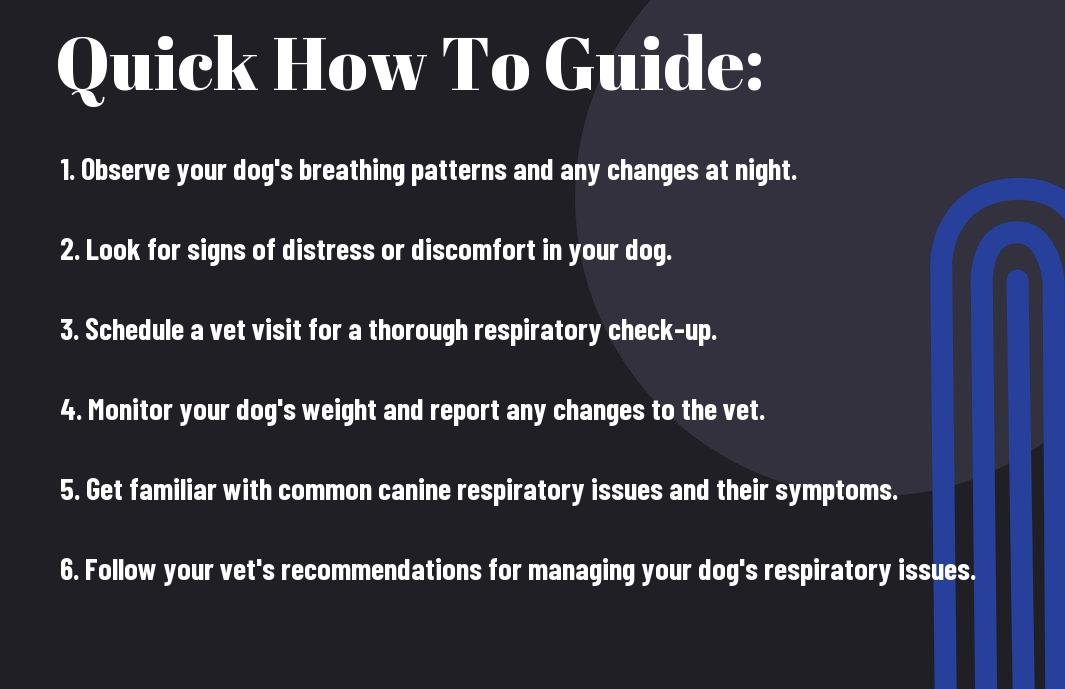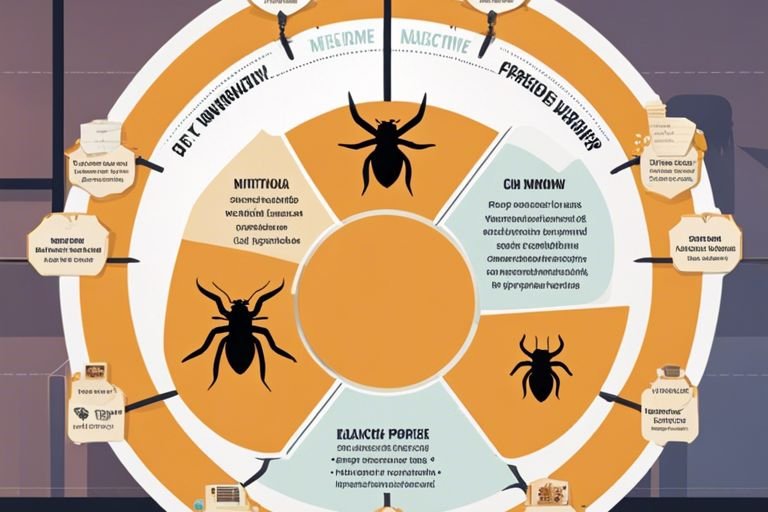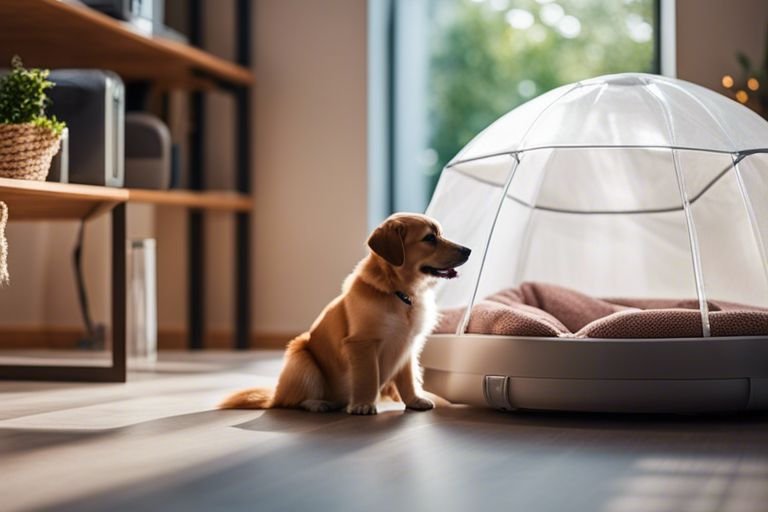Lately, I have noticed that my furry friend has been breathing heavy at night and it has been a cause for concern. If you find yourself in a similar situation, it’s important to understand that heavy breathing in dogs can be a sign of serious respiratory issues that need to be addressed. In this guide, I will walk you through the potential reasons why your dog may be experiencing heavy breathing at night and what you can do to help them. Understanding the signs and symptoms of respiratory issues in dogs can help you provide the best care for your beloved pet. So, let’s dive in and learn more about why your dog may be breathing heavily at night.
Key Takeaways:
- Heavy breathing at night in dogs can be a sign of respiratory issues that should not be ignored. Keep an eye on your dog’s breathing patterns and seek veterinary care if you notice any unusual symptoms.
- It’s important to monitor your dog’s overall health and behavior alongside their breathing patterns. Changes in appetite, energy levels, or coughing can provide important context for understanding their respiratory issues.
- Common causes of heavy breathing in dogs at night include heart disease, asthma, allergies, or respiratory infections. Understanding the potential underlying conditions can help guide treatment and management.
- Excessive weight and snub-nosed breeds are at a higher risk of experiencing breathing difficulties, especially at night. Maintaining a healthy weight and keeping your dog’s environment free from respiratory irritants can help prevent issues.
- Seeking prompt veterinary care is crucial if you notice your dog experiencing heavy breathing at night. Early diagnosis and treatment of respiratory issues can improve your dog’s quality of life and prevent more serious complications.
Understanding Canine Respiratory Issues
A dog’s respiratory system is a complex network of airways, lungs, and muscles that work together to ensure the proper intake of oxygen and elimination of carbon dioxide. Just like humans, dogs can experience a range of respiratory issues that can impact their breathing and overall health. As a pet owner, it’s important to be aware of common respiratory problems and understand the signs that indicate your dog may be experiencing respiratory distress.
Common respiratory problems in dogs
One of the most common respiratory problems in dogs is canine infectious respiratory disease (CIRD), also known as kennel cough. This highly contagious condition is typically characterized by a persistent, dry, hacking cough that can be worsened by excitement, exercise, or pulling on the leash. Another common issue is bronchitis, which can be caused by irritants in the air or underlying health conditions. Additionally, pneumonia is a serious respiratory infection that can be caused by bacteria, viruses, or fungi, leading to inflammation of the lungs and difficulty breathing.
Signs of respiratory issues in dogs
It’s important to be able to recognize the signs of respiratory issues in your dog. These can include labored or rapid breathing, coughing or wheezing, excessive panting, or nasal discharge. You may also notice changes in your dog’s energy levels and appetite. If you observe any of these symptoms, it’s crucial to seek veterinary care promptly to ensure the best outcome for your pet.
How to Help Your Dog Breathe Better at Night
If you’ve noticed that your dog is breathing heavily at night, there are a few things you can do to help improve their breathing and overall comfort. Here are some tips for creating a better sleeping environment for your furry friend.
Tips for improving air quality in your home
If your dog is experiencing heavy breathing at night, it could be due to poor air quality in your home. To improve the air they breathe while they sleep, consider these tips:
- Keep the house clean and free of dust and pet dander.
- Invest in an air purifier to remove airborne pollutants.
- Ensure proper ventilation in your home.
- Consider using humidifiers to keep the air moist, especially in dry climates.
Recognizing and addressing air quality issues can help improve your dog’s nighttime breathing and overall health.
Factors to consider for a comfortable sleeping environment for your dog
The comfort of your dog’s sleeping environment can also play a significant role in their nighttime breathing. Consider the following factors for creating an optimal sleeping environment:
- Provide a comfortable bed with proper support for your dog’s size and age.
- Keep the sleeping area quiet and free from disturbances.
- Regulate the temperature to ensure your dog is neither too hot nor too cold.
- Choose a sleeping location that is away from drafts and excessive noise.
The right sleeping environment can make a world of difference in your dog’s nighttime breathing and overall well-being.
Seeking Professional Help
Keep in mind that if you notice your dog breathing heavily at night or showing any signs of respiratory distress, it is crucial to seek professional help. Canine respiratory issues can be a serious concern, and early intervention is key to managing and treating them effectively.
When to consult a veterinarian
If you notice that your dog is experiencing heavy breathing at night or any other abnormal respiratory symptoms, it is important to consult a veterinarian as soon as possible. Signs such as wheezing, coughing, labored breathing, and excessive panting can indicate an underlying respiratory issue that requires medical attention. Additionally, if you observe any changes in your dog’s behavior, such as decreased activity or loss of appetite, it is essential to seek veterinary care promptly. Remember, early detection and treatment are crucial for improving your dog’s prognosis and overall well-being.
Treatment options for canine respiratory issues
When it comes to treating canine respiratory issues, the approach may vary depending on the underlying cause and severity of the condition. Your veterinarian will conduct a thorough physical examination, possibly including diagnostic tests such as X-rays, blood work, or specialized imaging, to determine the root cause of your dog’s respiratory distress. Once a diagnosis is made, treatment options may include medication, oxygen therapy, lifestyle modifications, or even surgical intervention in some cases. It is essential to follow your veterinarian’s recommendations closely and attend all follow-up appointments to monitor your dog’s progress and make any necessary adjustments to the treatment plan.

Understanding Canine Respiratory Issues
Drawing together everything we have discussed, it is important to remember that heavy breathing in dogs at night can be a sign of an underlying respiratory issue. If your dog is exhibiting this behavior, it is important to consult with your veterinarian to determine the cause and appropriate treatment. From allergies to infections, there are a variety of potential causes for heavy breathing, so it is crucial to seek professional guidance to ensure the health and well-being of your furry friend. By staying informed and proactive, you can help your dog breathe easier and enjoy a better quality of life.
FAQ
Q: Why is my dog breathing heavy at night?
A: Dogs can breathe heavily at night due to a variety of reasons such as stress, obesity, heart or lung diseases, and even extreme temperatures. It’s important to monitor your dog’s breathing patterns and consult a veterinarian if you notice any concerning changes.
Q: What are common respiratory issues in dogs that could cause heavy breathing at night?
A: Common respiratory issues in dogs include laryngeal paralysis, collapsing trachea, pneumonia, bronchitis, and heartworm disease. These conditions can cause heavy breathing, coughing, and wheezing, especially during nighttime when the dog is at rest.
Q: How can I help my dog breathe easier at night?
A: To help your dog breathe easier at night, make sure they have a comfortable and well-ventilated sleeping area. Keep the room at a moderate temperature and maintain good air quality. Additionally, regular exercise, weight management, and stress reduction can improve your dog’s overall respiratory health.
Q: When should I be concerned about my dog’s heavy breathing at night?
A: If your dog’s heavy breathing at night is accompanied by other symptoms such as excessive panting, coughing, wheezing, or blue-tinged gums, it could indicate a serious respiratory issue. It’s important to seek veterinary care immediately if you notice these signs.
Q: What can a veterinarian do to help diagnose and treat my dog’s heavy breathing at night?
A: A veterinarian can perform a thorough physical examination, chest X-rays, blood tests, and other diagnostic procedures to determine the underlying cause of your dog’s heavy breathing at night. Treatment may include medications, lifestyle changes, and in some cases, surgical intervention to improve your dog’s respiratory health.




